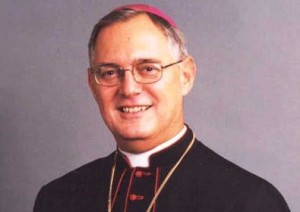 Many Roman Catholics look to those who hold exalted positions within the hierarchy of the church for guidance on moral issues, but if polls on the behavior of Catholics in their personal lives regarding such issues as birth control and marriage equality are any indication, most Catholics find their morality elsewhere.
Many Roman Catholics look to those who hold exalted positions within the hierarchy of the church for guidance on moral issues, but if polls on the behavior of Catholics in their personal lives regarding such issues as birth control and marriage equality are any indication, most Catholics find their morality elsewhere.
Still, this does not stop some high ranking prelates, such as Bishop Thomas Tobin of the Diocese of Providence, from publicly pontificating on issues of concern to the church and using his not inconsiderable political power to influence the General Assembly to hue closely to Catholic ideals. As reported on RI Future, “The President, the entire congressional delegation, the governor and the House all would support marriage equality in Rhode Island. But ‘probably two handfuls’ of Catholic state senators still stand in the way.” Unfortunately, those two handfuls of Catholic senators give the impression of answering to Bishop Tobin first, and their constituents and the Constitution of the United States second.
Tobin is unafraid to take strong stands to advance the political agenda of his church in a very public way. In 2009 the bishop famously denied Rhode Island Congressman Patrick Kennedy the sacrament of communion because Kennedy supported a woman’s right to choose in matters of abortion and family planning.
Speaking on Fox News’ Bill O’Reilly show in December of 2009, Tobin said:
I think the Church has every right and indeed the obligation to be at the table in these important questions of public policy and certainly the bishops have been for a long time now involved in the question [of] health care and the legislation that’s been developing and lots of other issues too and as I’ve often said, if the church, not just the Catholic church, but the religious community, if we don’t bring these values, this spiritual vision to these discussions, who else will do that?
O’Reilly, to his credit, pushed back against Tobin somewhat, asking why he would deny legislators sacraments in the case of supporting abortion rights but not in the case of a politician supporting capital punishment. Tobin differentiated between abortion and capitol punishment:
Abortion we believe is intrinsically wrong, it’s always wrong. There are no circumstances under which abortion can be justified… the church has been very clear and very consistent about that. However the church has also taught pretty consistently the death penalty, while it is not necessary and probably immoral in our time, at least in theory there may be circumstances that allows the death penalty to be a moral option.
To a non-Catholic Tobin’s distinction may seem arbitrary or overly legalistic, but the bishop, when speaking on matters of Catholic theology and doctrine should be taken at his word. Tobin clearly intends to ground his public comments on political issues in morality as interpreted by the Catholic Church. He said as much recently on the May 15, 2012 Buddy Cianci Show. Talking about marriage equality, Tobin said:
We don’t want to fight with [proponents of same-sex marriage] but we do have the right and I think the duty to comment on these issues and the pieces of legislation we think are objectionable and we’ll try to do that but we’ll try to do that respectfully.
Odd then, that even given the distinction he makes between between abortion and capital punishment, Tobin would be more concerned with opposing marriage equality and standing up for such seemingly trivial matters as the prayer banner in Cranston or the cross in Woonsocket than in standing up against capital punishment. These other issues are not life or death propositions, though certainly the quality of life would be improved immeasurably for many in our state by the passage of a marriage equality bill.
Clarifying his position on the death penalty through the lens of the Pleau case, Tobin explains why he does not feel qualified to speak out on this issue on the May 10, 2012 John DePetro Show:
The position of the church on capital punishment is rather clear, that we do do not think that the use of capital punishment in necessary or appropriate in our culture and in our society today. I’ve intentionally stayed away from this particular issue because it gets quickly involved in constitutional issues and state’s rights issues and federal law and local law that I’m really not qualified to talk about. So while in principle I would support the rejection of the use of capital punishment I’ve intentionally stayed away from this particular [case] because it does get rather involved in technical legal issues that I’m not at all qualified to address.
Elaborating further, if a bit repetitively, Tobin adds:
…there are some technical legal questions involved and again that’s why I’ve deliberately tried to stay out of that issue because it’s well beyond my competence to try and say where the Federal law begins and where the state law begins and the responsibilities of the federal government and governor. While [Catholics] certainly reject the use of capital punishment in our culture and our society today because it is, again, the taking of a human life, we don’t think it’s necessary. This is a very complex issue that involves law and the Constitution on the one hand, but very deep and personal and heartfelt emotions on the other and it’s enormously difficult to balance the two.
So with this deft bit of verbal lawyering Tobin divorces himself from having to speak out on the issue of capital punishment because he is not a lawyer. This makes sense, in a way, because Tobin is a theologian, not a lawyer, and should optimally only be engaged in theological pursuits and providing moral guidance for the Catholics in his church. But how do we square Tobin’s reluctance with his earlier assertion that he and his church “…have the right and I think the duty to comment on these issues and the pieces of legislation we think are objectionable…”
Tobin can certainly sound lawyerly when he wants to. Speaking about the Cross in Woonsocket now at the center of a church/state separation debate, Tobin said:
It certainly has nothing to do with the separation of church and state, this is not the establishment of a denomination, it’s not the establishment of a particular church or the recognizing of a church by the state, this is a cultural symbol…
One might be led to believe that the Woonsocket Cross is not “a very complex issue that involves law and the Constitution” that Tobin is “not at all qualified to address” but is instead a simple moral issue that the bishop feels well qualified to speak out on. On this issue and others, Tobin is not prepared to claim legal ignorance but instead speaks out forcefully.
On the May 10th DePetro Show Tobin decried President Obama’s recent declaration that his position has evolved and that he now personally supports marriage equality. Tobin said:
It’s a very, very strange evolution. The man has no real moral foundation, moral compass. This is clearly politically driven… It’s unfortunate that the leader of our nation doesn’t have a stronger moral compass to direct him… and you know, some of the other politicians who have chimed in on this I think have the same lack of moral foundation, whether you talk about President Obama or Vice President Biden or the Senators, Whitehouse and Reed or the Congressmen Langevin and Cicilline, none of them have a strong moral foundation or compass, there’s not a single profile in courage among the lot.
Speaking of Reed, and the rest of the Rhode Island delegation, Tobin added:
I think the whole group … are driven by the Democratic agenda.
and
In many of these cases, for some of these politicians it’s more important for them to be a Democrat than a Catholic and in many cases they’ve abandoned the basic teaching of the church.
Let’s go back to Tobin’s attack on Congressman Kennedy, a Democrat. Let’s go back to the silly issue over the Christmas Tree, or Holiday Tree, as Governor Chafee’s office called it. Even though plenty of evidence was produced to show that former Governor Carcieri, a Republican, had also referred to the tree in the Rhode Island State House as a Holiday Tree on more than one occasion, Tobin never had an issue with the designation until Governor Chafee took office. Chafee, an independent who strongly favors marriage equality, is disliked by Bishop Tobin whereas Carcieri found in Tobin a staunch supporter.
This is likely why Tobin will not take a strong stance on the Pleau case. Governor Chafee is making a very strong, moral case that Rhode Island’s long and historic opposition to the death penalty necessitates exhausting every legal option, up to and including the Supreme Court, to prevent a Rhode Island citizen from facing the death penalty on a Federal level. Though it is a complex legal case, the morality of the death penalty is a comparatively simple moral stance to take from the point of view of a Roman Catholic, but Tobin balks. Though the bishop would, in theory, oppose the death penalty on Catholic theological grounds, he seems to not want to do anything that might make it appear that he is supporting the governor, a political enemy.
It should surprise no one that Bishop Tobin’s political bent is not progressive or liberal. It is right-wing and authoritarian in the worst way. He is anti-gay rights, anti-women’s rights, and even opposed to the constitutional separation of church and state. Tobin is a theocrat. Even the most progressive stance he espouses, that the death penalty is at least in theory morally wrong is shrouded in caveats:
…we do do not think that the use of capital punishment is necessary or appropriate in our culture and in our society today.
Note that Tobin qualifies that statement with the word, “today.” The death penalty was appropriate in the past (perhaps when the Catholic Church had nearly unlimited political power) and may one day be morally correct in the future (in that nightmare world where the Catholic Church has massive political power once more.) It is only today, when the moral certainty of the Catholic church is marginalized by secular society, that capital punishment is considered wrong by Tobin.
Tobin’s reactionary politics may be abhorrent to progressives and humanists, but in truth little more can be expected from a man so deeply vested in the ancient theocratic mindset prevalent in today’s Catholic Church. I would venture that Tobin’s tenure as Bishop has been devastating to Rhode Island Catholics especially since under his tenure the percentage of Catholics in the state has dropped to 44% according to a study by the Association of Statisticians of American religious Bodies. Indeed, Rhode Island can no longer claim to be the most Catholic state in the United States, that distinction now belongs to Massachusetts.
Worse than his politics is Tobin’s style of public discourse. On the marriage equality debate, Tobin said:
…let me emphasize [when] we [the Roman Catholic Church] participate in these public debates it’s never intended to be insulting or personally offensive [to people of] same-sex orientation. They are children of God and certainly our brothers and sisters in the community.
Apparently the insulting and personally offensive comments are reserved for those working to preserve the reproductive rights of women. On the Providence Diocese website RICatholic.com, The American Civil Liberties Union, Planned Parenthood, Humanists of Rhode Island, Rhode Island Medical Society, Brown Medical Students for Choice and Catholics for Choice were referred to as “radical promoters of death” for speaking out against laws that seek to limit a woman’s right to access birth control, including abortion.
Tobin equates atheism with a lack of morality, though even the most conservative Catholic theologians understand that people can be moral without a belief in God. Tobin is quick to make gross, sweeping characterizations about non-believers. Speaking on the April 24th John DePetro Show about the cross in Woonsocket, Tobin makes the following, almost paranoid statement:
Do we want a state and a nation completely free of any expressions of faith or references to God or moral values or spiritual values order we want a state and a nation where these things are part of our life and part of our culture. I think the church, the religious community, the faith community has so much to contribute to our citizens, to our individuals but to our common life together that’s the kind of nation state we have had historically, but unfortunately these other forces of secularism and atheism are encroaching upon us. You know the governor has that famous quote he said that “the world is changing” well I hope it’s not changing that much because then we’re going to be completely separated from God and we’ll be living truly in an atheistic culture and society and i don’t think most of our people want that.
Tobin fears living “in an America where the separation of church and state is absolute—where no Catholic prelate would tell the President (should he be Catholic) how to act, and no Protestant minister would tell his parishioners for whom to vote—where no church or church school is granted any public funds or political preference—and where no man is denied public office merely because his religion differs from the President who might appoint him or the people who might elect him.” Tobin fears this because in this America he would just be just another priest, ministering to his flock, watching his religion become ever more redundant in a world that has left ancient and medieval beliefs behind. By the way, the above quote is from John F. Kennedy in his address to the Greater Houston Ministerial Association from September 12, 1960.
Tobin seems well acquainted with this former president. Not only is former Congressman Patrick Kennedy JFK’s nephew, Tobin obliquely referenced the first and so far only Catholic president when speaking of the Congressional delegation from Rhode Island, saying, “there’s not a single profile in courage among the lot.” Profiles in Courage is a 1955 Pulitzer Prize winning book by JFK that “describes acts of bravery and integrity by eight United States Senators throughout the Senate’s history.” Tobin knows the popularity of JFK among his Catholic constituency, and his use of the presidents book title to disparage our present crop of senators and congressmen is particularly appalling given Kennedy’s expressed views on church/state separation.
Roger Williams, the founder of Rhode Island, famously said, “…when one mixes religion and politics, one gets politics” and that’s something that Bishop Tobin should pay more attention to. The more involved the Catholic Church gets involved in politics the less it becomes a church and the more it becomes just another conservative political lobby. Mythological belief systems may work to undergird a system of personal morality for some people but actively working to enforce those personal values on everyone in our secular society is theocratic, anti-Democratic and anti-American.
Bishop Thomas Tobin frocks himself in the garments of moral authority and spiritual leadership but his conservative politicking on social issues reveal him as a naked hypocrite. When it comes to morality and ethics, the Bishop has no clothes.
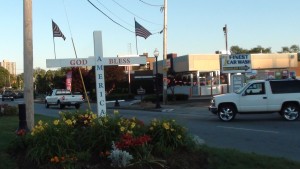 Peter Montequila, the owner of Finest Car Wash has stated a variety of reasons for having erected a cross on a publicly owned median strip on Pleasant Valley Parkway in Providence. According to one story the cross was built because the Fourth of July (or Memorial Day) was coming up. Montequila also claims he placed the religious symbol there to demonstrate solidarity with those who want the war memorial topped with a cross in Woonsocket to stay on public land. On the other hand, perhaps Montequila feels entitled to act as he did, having maintained the median by mowing the lawn, installing a sprinkler system, and planting flowers as part of what appears to be a city sponsored adopt-a-spot program. Still another reason for the cross, according to the owner, is that he seeks to honor veterans.
Peter Montequila, the owner of Finest Car Wash has stated a variety of reasons for having erected a cross on a publicly owned median strip on Pleasant Valley Parkway in Providence. According to one story the cross was built because the Fourth of July (or Memorial Day) was coming up. Montequila also claims he placed the religious symbol there to demonstrate solidarity with those who want the war memorial topped with a cross in Woonsocket to stay on public land. On the other hand, perhaps Montequila feels entitled to act as he did, having maintained the median by mowing the lawn, installing a sprinkler system, and planting flowers as part of what appears to be a city sponsored adopt-a-spot program. Still another reason for the cross, according to the owner, is that he seeks to honor veterans.
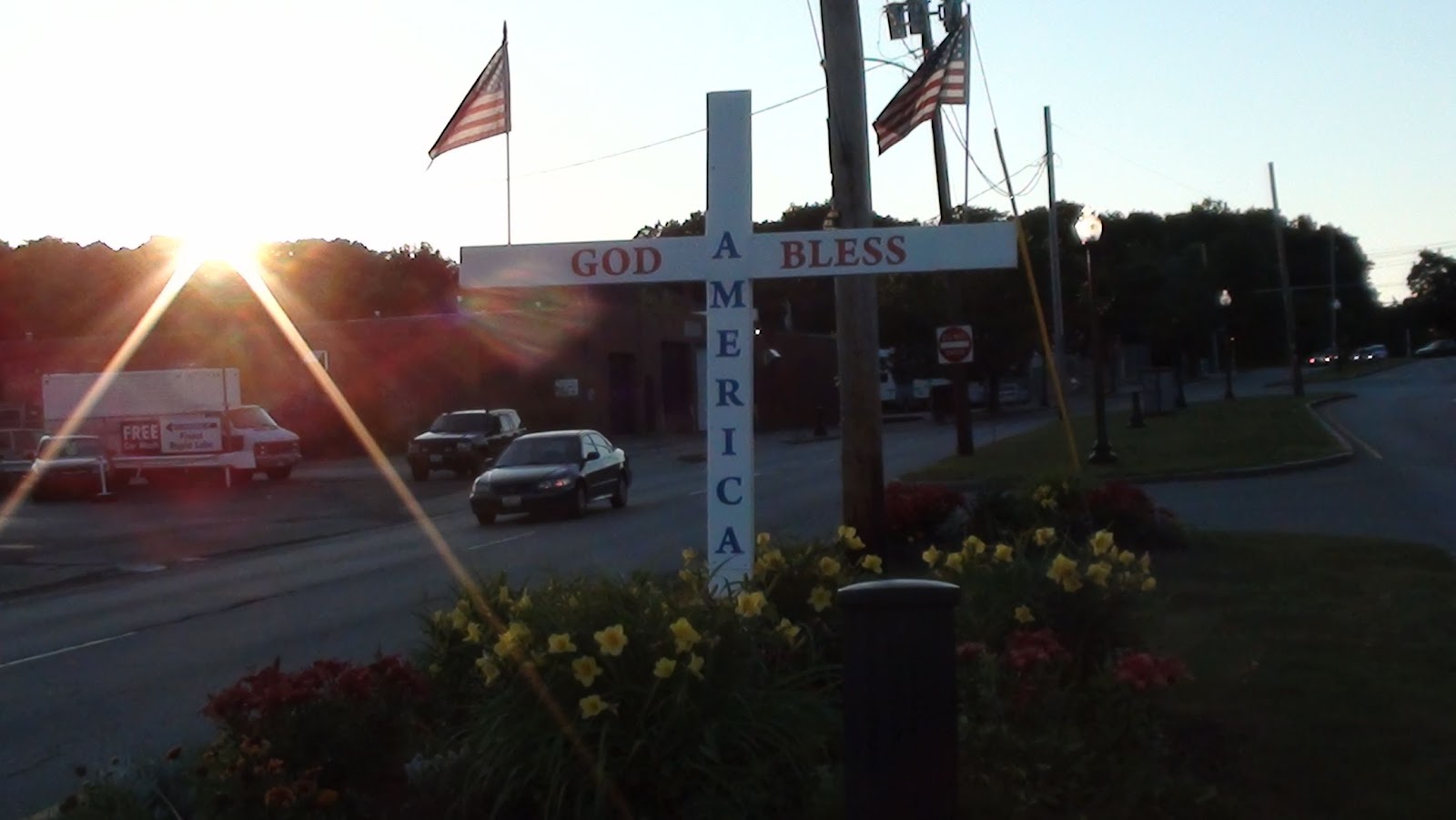

















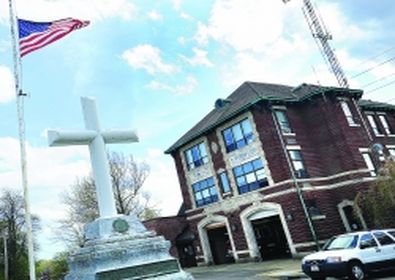
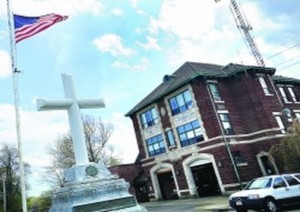 The Supreme Court today denied an appeal in a case involving the Mount Soledad Cross in La Jolla, California, thereby effectively ruling the 29-foot tall cross on public property unconstitutional. (For a history of the Mt. Soledad cross, see
The Supreme Court today denied an appeal in a case involving the Mount Soledad Cross in La Jolla, California, thereby effectively ruling the 29-foot tall cross on public property unconstitutional. (For a history of the Mt. Soledad cross, see 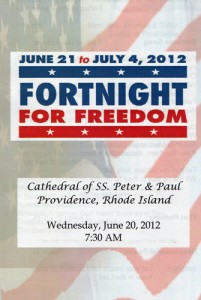 In the United States, Roman Catholic bishops have called for an alliterative “Fortnight for Freedom” to run from June 21, the vigil of the Feasts of St. John Fisher and St. Thomas Moore, to July 4. The bishops are calling on the faithful to use these two weeks for prayer, study and action, specifically regarding the HHS mandate, requiring employers to provide reproductive services as part of their health care. The Catholic Church, as well as many other religious, anti-reproductive rights groups, have decided this is an abridgment of their religious freedom and are waging a political and public relations war against the mandate.
In the United States, Roman Catholic bishops have called for an alliterative “Fortnight for Freedom” to run from June 21, the vigil of the Feasts of St. John Fisher and St. Thomas Moore, to July 4. The bishops are calling on the faithful to use these two weeks for prayer, study and action, specifically regarding the HHS mandate, requiring employers to provide reproductive services as part of their health care. The Catholic Church, as well as many other religious, anti-reproductive rights groups, have decided this is an abridgment of their religious freedom and are waging a political and public relations war against the mandate.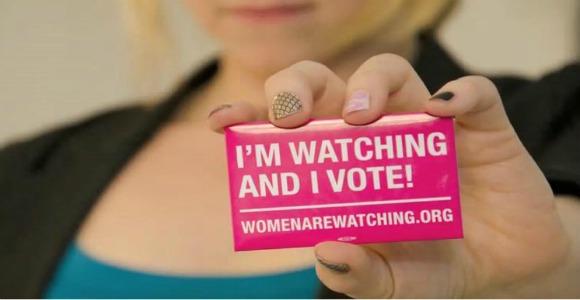
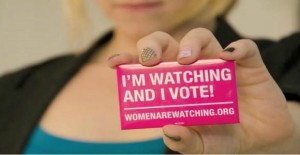




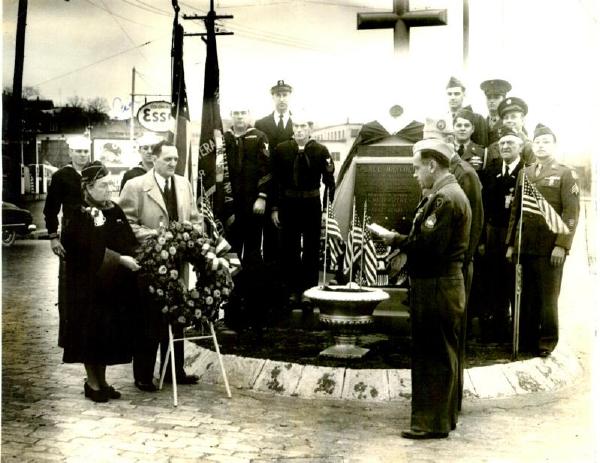




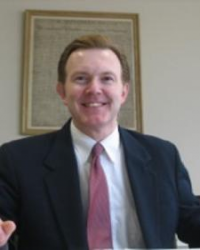




 I’m an atheist. Let’s put that aside right away. I’m an atheist for very personal reasons, and it’s a decision I arrived at after very careful thought and much emotional difficulty. And I understand that this distinction sets me apart from a large majority of my peers and indeed the rest of Americans. To say that life is difficult for an atheist is an understatement, we can see the proof of this today with Jessica Ahlquist in Rhode Island. And as we put a close to this chapter in our history I want to make a call for unity going forward.
I’m an atheist. Let’s put that aside right away. I’m an atheist for very personal reasons, and it’s a decision I arrived at after very careful thought and much emotional difficulty. And I understand that this distinction sets me apart from a large majority of my peers and indeed the rest of Americans. To say that life is difficult for an atheist is an understatement, we can see the proof of this today with Jessica Ahlquist in Rhode Island. And as we put a close to this chapter in our history I want to make a call for unity going forward.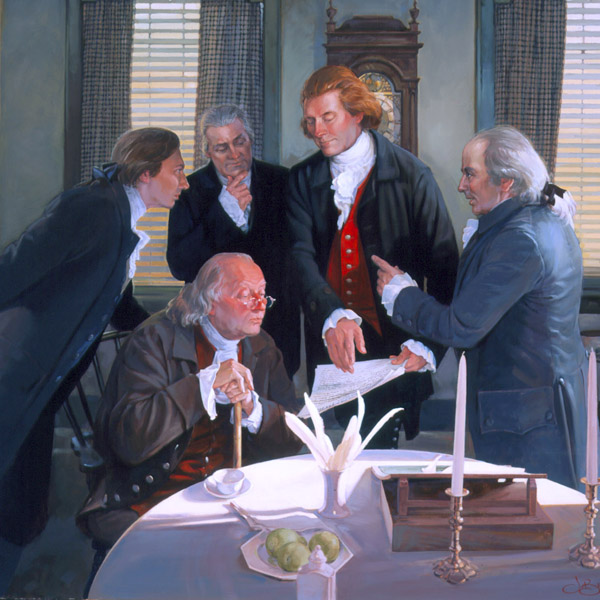
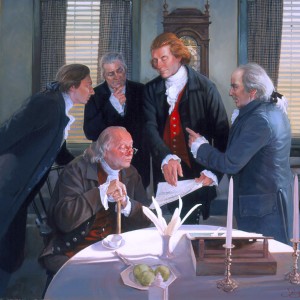

 So last night Ron Paul gave a rousing speech in New Hampshire after he lost the primary there. He went on and on about FREEDOM of course, his supporters apparently unconcerned that Paul’s concept of freedom does not include a woman’s right to choose, many forms of birth control or laws that protect freedom, like the 1964 Civil Rights Act. Paul’s idea of FREEDOM is strictly a kind of faux free market libertarianism. Rousing the libertarian base, he claims that all problems will be solved by the free market. For instance, if you get really sick, and your health care doesn’t cover a procedure, the free market allows you to find a charity, enter indentured servitude, or die.
So last night Ron Paul gave a rousing speech in New Hampshire after he lost the primary there. He went on and on about FREEDOM of course, his supporters apparently unconcerned that Paul’s concept of freedom does not include a woman’s right to choose, many forms of birth control or laws that protect freedom, like the 1964 Civil Rights Act. Paul’s idea of FREEDOM is strictly a kind of faux free market libertarianism. Rousing the libertarian base, he claims that all problems will be solved by the free market. For instance, if you get really sick, and your health care doesn’t cover a procedure, the free market allows you to find a charity, enter indentured servitude, or die.
 Recently, Humanist and philosopher John Shook said it very simply, and I have to agree with him: Humanism cannot support the death penalty. His full article is linked and I would suggest that everybody with an interest in justice read it, but one part bears repeating here: Humanism stands for valuing the lives of all, individual human rights, justice for everyone, and governments that defend all of their people. These grounds alone are sufficient for abolishing the death penalty.
Recently, Humanist and philosopher John Shook said it very simply, and I have to agree with him: Humanism cannot support the death penalty. His full article is linked and I would suggest that everybody with an interest in justice read it, but one part bears repeating here: Humanism stands for valuing the lives of all, individual human rights, justice for everyone, and governments that defend all of their people. These grounds alone are sufficient for abolishing the death penalty.